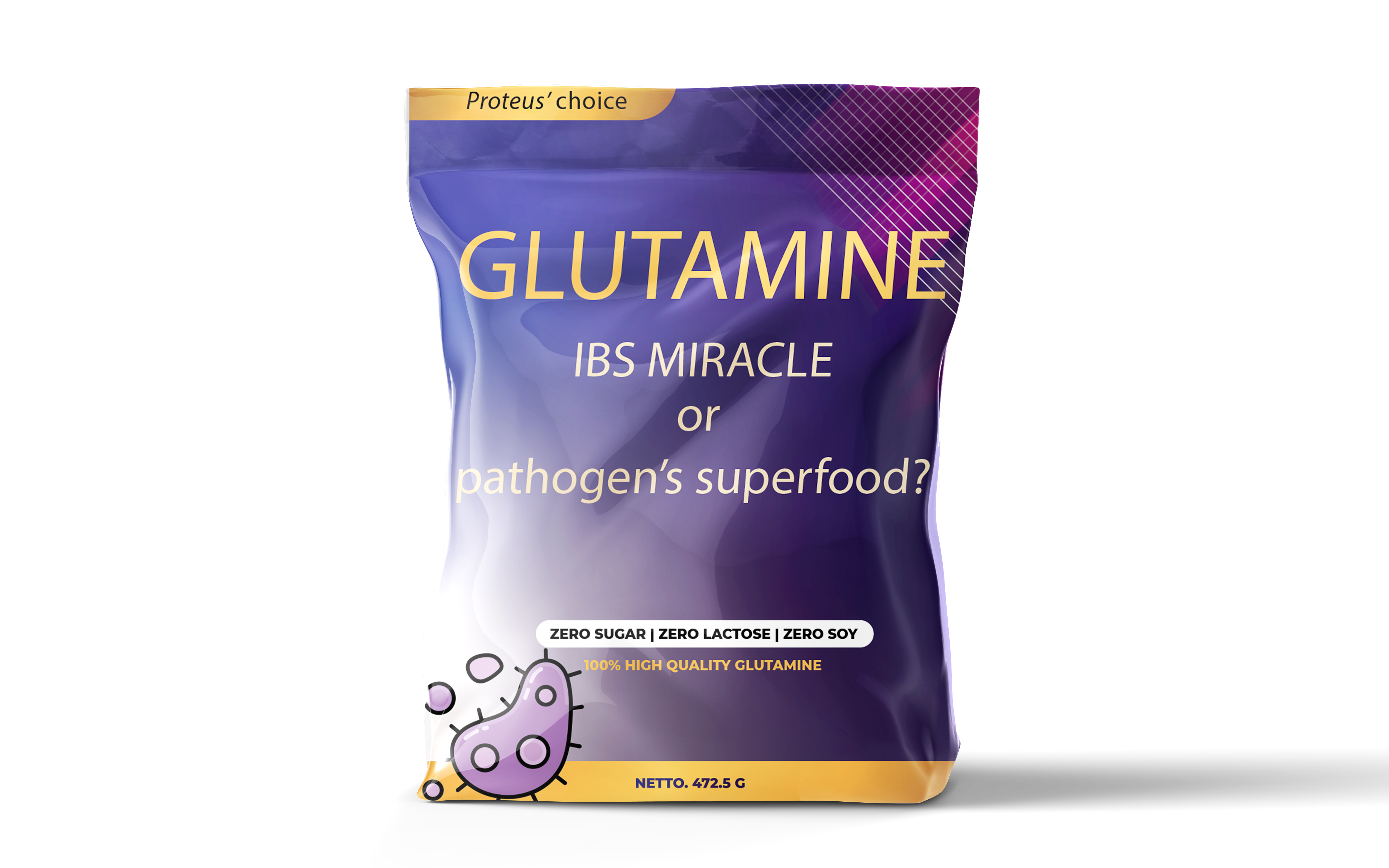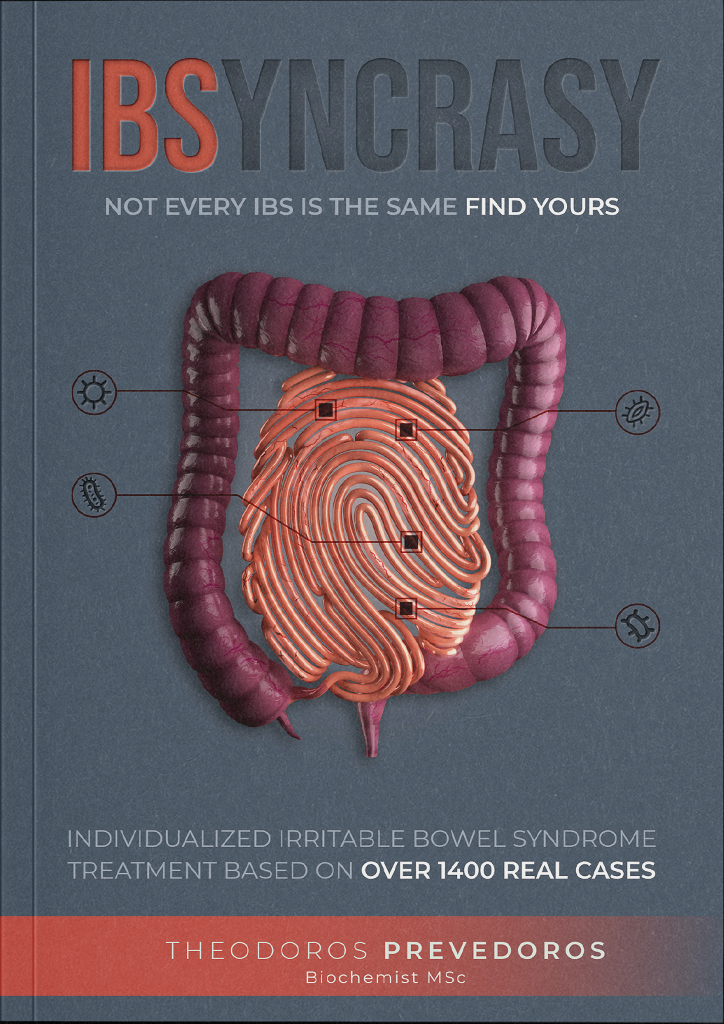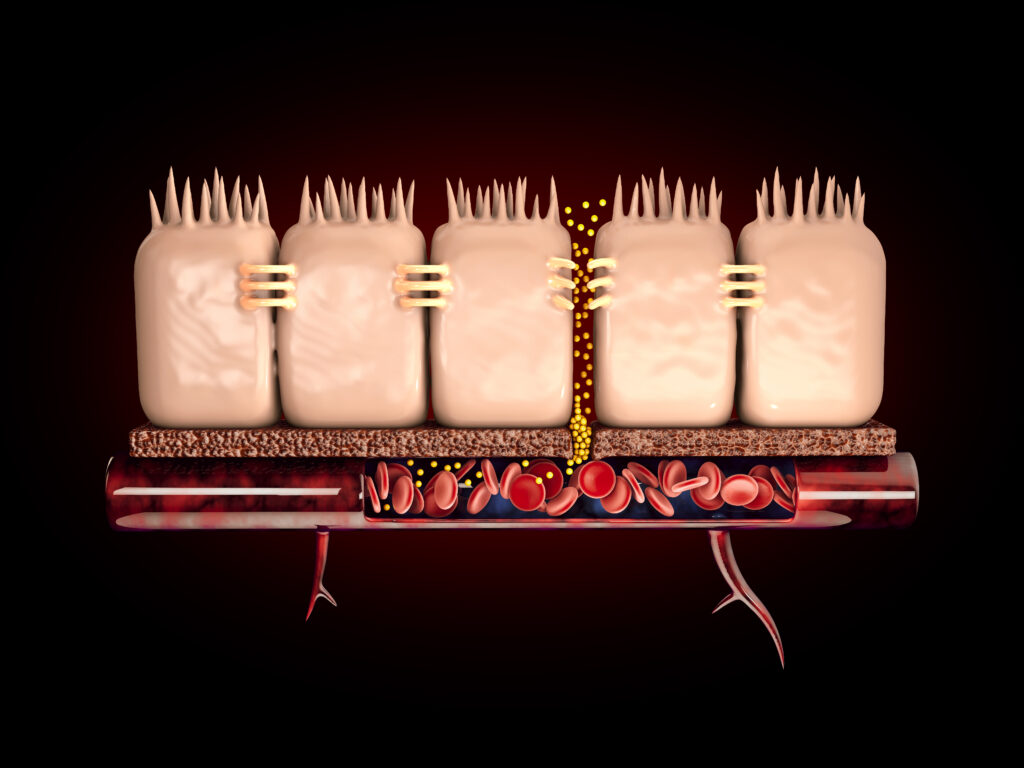When you should not take glutamine for IBS
IBS miracle or pathogen's superfood?

L-glutamine is a non-essential amino acid that is used in making almost every protein in our body. Besides this structural role, L-glutamine is crucial in key neurotransmitting processes as it is a pool substrate for making the most important (both in health and disease) excitatory molecule, glutamate.
Glutamine of great importance for gastrointestinal symptoms
Indeed, glutamine is very useful when it comes to functional gastrointestinal symptoms, like bloating and flatulence. Observational and case control studies have shown that glutamine may restore the gut barrier and reduce most annoying gastrointestinal symptoms when taken in large amounts, and this is why it is widely used by both practitioners and patients themselves. Glutamine also works as a fuel by intestinal cells, thereby it must be supplied in adequate amounts. Our cells possess specific molecular mechanisms that take up glutamine and transform it to useful products. But are we the only ones that can use glutamine?
Not only humans utilize glutamine
Of course, when it comes to the intestinal ecosystem, we are not alone. In fact, we are vastly outnumbered by almost 100 trillion microbes, divided in about 1100 families. Each one of these families has its unique, fingerprint like, metabolism, consisting of hundreds of chemical reactions. Thus, it is not a surprise, that glutamine may be used by other cells (notably bacterial) for their own purposes. In fact, one of the most notorious bacterium, namely Proteus mirabilis, needs excess glutamine quantities in order to exert its pathological properties.
What does Proteus need glutamine for?
First of all it needs glutamine to make protein. That far is ok, since he will use specific amounts of glutamine and that’s all. But what happens when there is excess glutamine in his microenvironment? Proteus possesses another property which is called swarming. This property is defined as the coordinated movement of a population across surfaces. Swarming is initiated under specific circumstances and when there is enough of a specific stimulus. In this case, Proteus will swarm when there is excess glutamine in his environment. Remember that anyone who takes large amounts of glutamine will absorb only a minor fraction, and the rest will stay in his gut. Under these conditions, swarming is inevitable. In order for this bacterium to swarm, first it must undergo some morphological and metabolic alterations. In fact Proteus, when in swarming state, acquires antibiotic resistance and produces large amounts of ammonia and other, non gut-friendly products. Actually, in laboratory settings, glutamine is used in order to study the swarming potential of Proteus species.
Pathologic mechanisms of Proteus
Swarming
Proteus has the ability to attach to host tissues with the help of its specialized pili. Once attached, an inflammatory cascade begins that includes molecules with high damage potential, like interleukin-6
Inflammation
Several Proteus species possess the ability to produce large amounts of histamine. This reaction is highly active while Proteus swarms, making it a principle mediator of atopic diseases, like allergies, asthma and diarrhea
Histamine production
Proteus spc possess strong urease activity. Urease will use extra urea to produce ammonia. In turn, ammonia will make the environment more alkaline and favor the growth of non commensal microbial populations
Urease activity
Proteus species modify their antibitioc resistance gene expression pattern in response to excess glutamine in their environment, making eradication difficult. The longer their populations exist in swarming state, the greatest the antibiotic resistance
Antibiotic resistance
Even when Proteus dies, it releases a proinflammatory molecule, namely LPS, which passess through the intestinal barrier and may react with almost every human organ. High LPS levels are detected in people suffering from autoimmune disorders, autism and neurodegenerative diseases like Parkinson’s
Systemic effects
So why people taking glutamine actually feel better?
People who take glutamine may feel better temporarily because it is a trophic agent. It helps restore epithelial junctions and reduce SIBO. The problem begins when there is Proteus (or other swarming bacteria) overgrowth. These patients may feel better for a while, but in fact the problems gets bigger, so the next relapse of their disease may be magnified.
Who should be first checked for Proteus before taking glutamine
While Proteus is found in almost everyone’s gut ecosystem, it’s concentration is self-regulated as a function of nutrient availability, spatial requirements and host’s immune well being. When these conditions are pathologically altered, Proteus expands. Patients that are susceptible to Proteus overgrowth are:
- Chronic IBS patients
- Patients taking immunosuppressive treatment
- Diabetics
- People prone to UTI’s
- Athletes with bowel symptoms
- IBD patients (Crohn’s disease and ulcerative colitis)

Proteus causes problems at levels below the ones that can be recovered with stool cultures
Most culture techniques report Proteus as negative. Unfortunately, IBS symptoms attributed to Proteus may manifest at these negative levels. Remember that Proteus lives in almost every human gut, so negative just means low levels. Practically, the best way to measure bacterial levels on stool is Mass Spectroscopy. Levels above 10.000 cells per gram of stool may potentially cause symptoms, under several conditions.
My experience on Proteus exaggerated intestinal symptoms
Usually, patients whose Proteus levels are elevated present with some kind of inflammation. Even IBS (a non-inflammatory syndrome) patients have elevated CRP or erythrocyte sedimentation rate. Most of the times they complain of pain outside their gut, stiffness and sometimes allergies. It is not uncommon to suffer from an autoimmune disease, either in bowel or another system.
Main symptoms from IBS patients whose stool PCR recovered Proteus or Proteus-like overgrowth
Most had more than 1 main complaint
Treatment
Treatment of IBS patients who are diagnosed with Proteus overgrowth is dependant on the time this bacterium is overgown. Due to its properties, Proteus reconditions its microenvironment and makes it friendly for its own growth. This is why antibiotic treatments may lower bacterial levels, but the remaining favor its regrowth. In fact, eradication in such cases is one of the most difficult tasks, and besides antimicrobial treatment, other treatments and lifestyle changes must be implemented in order to restore gut physiology and reinoculate beneficial microflora.
Takeaway message
Every substance, natural or chemical, has its risks when given in therapeutic doses. Glutamine, despite being a naturally occurring amino acid, if taken in large doses may exacerbate several gastrointestinal symptoms. In fact, there is another dark side of glutamine. Many cancers, at certain differentiation stages, use glutamine to survive and spread. Concerning IBS, while glutamine causing worsening of the disease is not very common, it is something I’ve seen many times in my practice. If a patient fulfills one of the above risk factors, a thorough stool test must be performed before scheduling the treatment.

With a background in Chemistry and Biochemistry from the National and Kapodistrian University of Athens, Theodoros brings a wealth of knowledge in functional medicine and advanced treatments to his role. He possesses exceptional skills in analysis, pattern recognition, diagnostic translation, and storytelling. He is also FMU certified in Functional Medicine and has received training in advanced treatments from the Saisei Mirai Clinic in Japan.


